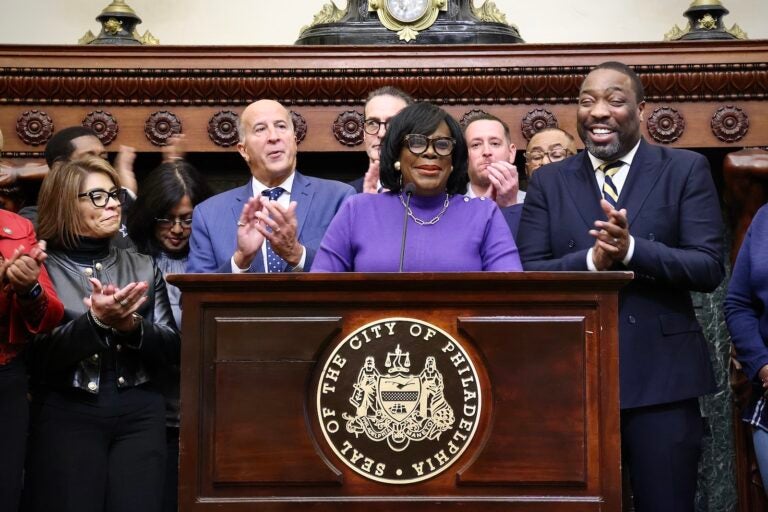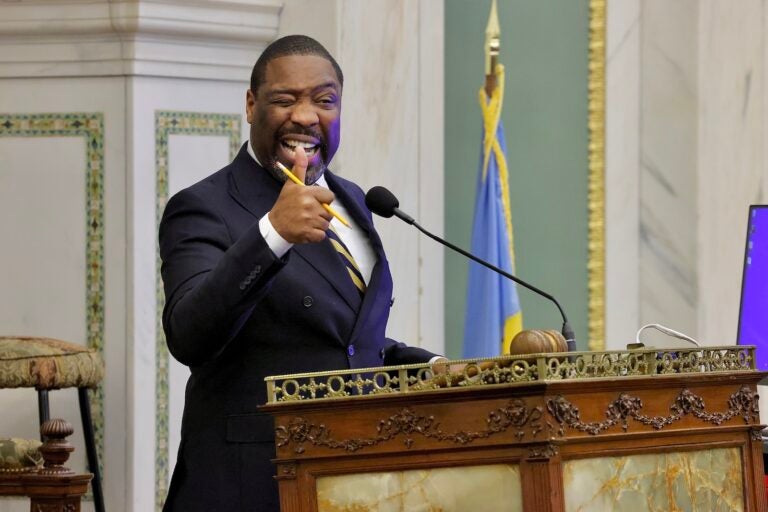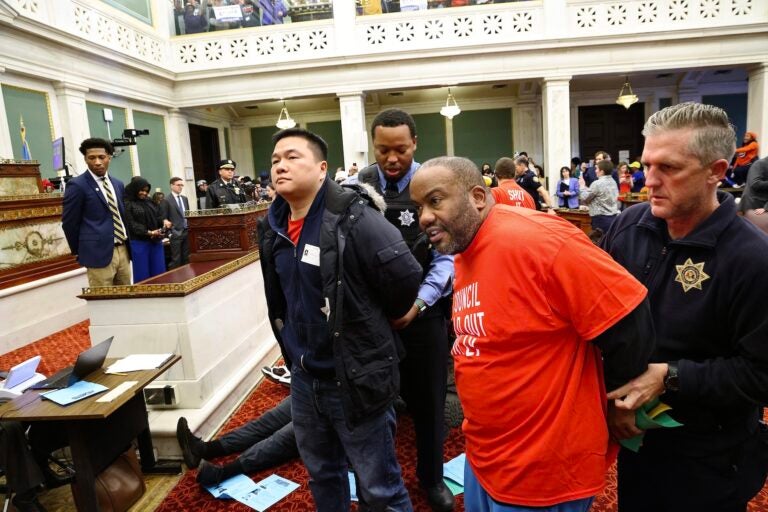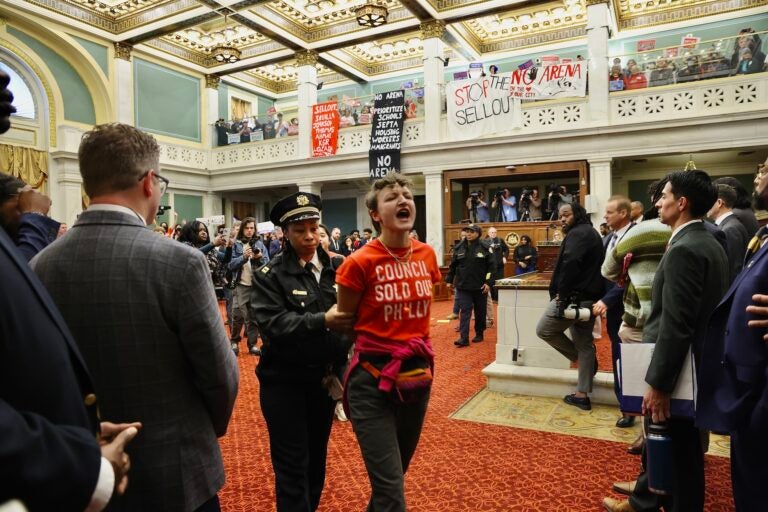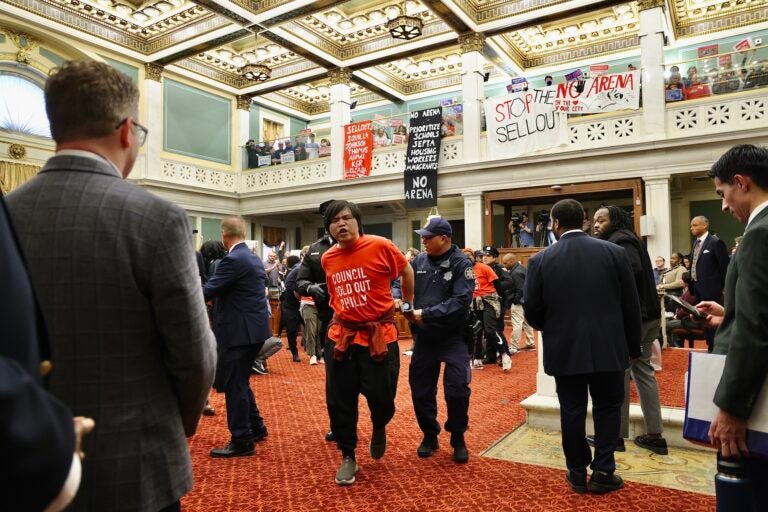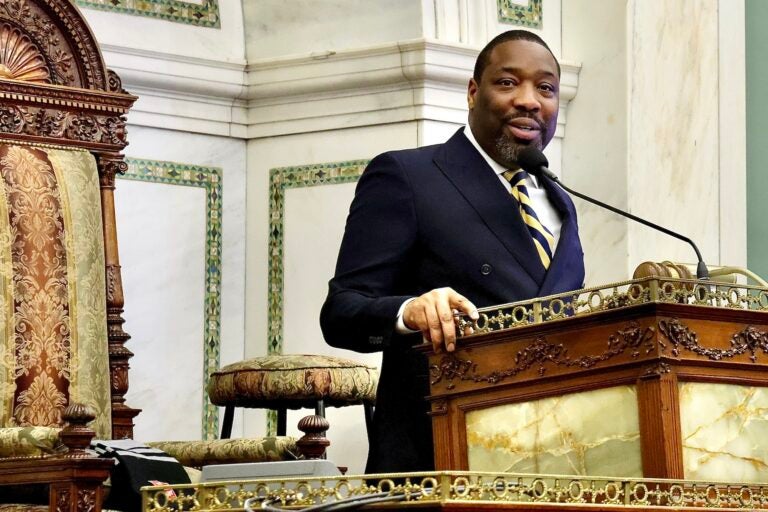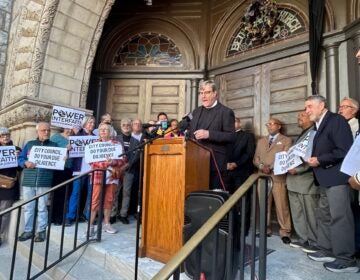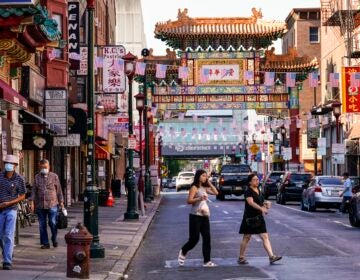After protesters removed from chambers, Philly Council votes 12-5 to approve Sixers’ arena proposal
The controversial development is now on track to open in Center City in 2031.
Listen 1:07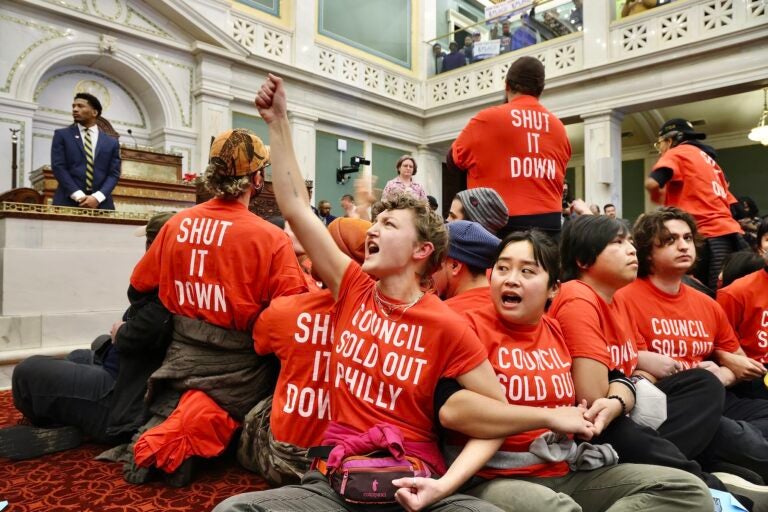
Protesters on the floor of City Council chambers prior to a vote on the Sixers arena. (Emma Lee/WHYY)
What you need to know
- The 76ers have proposed moving to a new $1.55 billion arena near Chinatown called “76 Place”
- The proposal has drawn swift condemnation, excitement, skepticism — and plenty of buzz
- Black Clergy of Philadelphia has endorsed the project, while a majority of Chinatown businesses and other community members have voiced their opposition
Philadelphia lawmakers on Thursday passed a package of bills authorizing the 76ers to build a new arena in Center City, ending a contentious legislative process featuring hours of public testimony, intense closed-door negotiations, and the forcible removal of several arena opponents from council chambers.
The 12-5 vote was largely expected. City Council’s Committee of the Whole, composed of all 17 lawmakers, advanced the same legislation last week during a raucous hearing held before its regular meeting.
“Contrary to popular belief, if we had turned down this particular deal, we would have been fools,” said Council President Kenyatta Johnson after the vote. “This is a project that I believe will transform Center City.”
The $1.3 billion development is backed by Mayor Cherelle Parker, meaning she is almost guaranteed to sign any related bills when they reach her desk. Greenlighting the arena would be considered a defining moment of her first term in office.
Thursday’s vote comes more than two years after the team announced its arena proposal. The Sixers are now on track to open the facility for the 2031-2032 season, when its lease expires at the Wells Fargo Center in South Philadelphia. Under a deal brokered by the Parker administration, the Sixers will remain in the city until at least 2061.
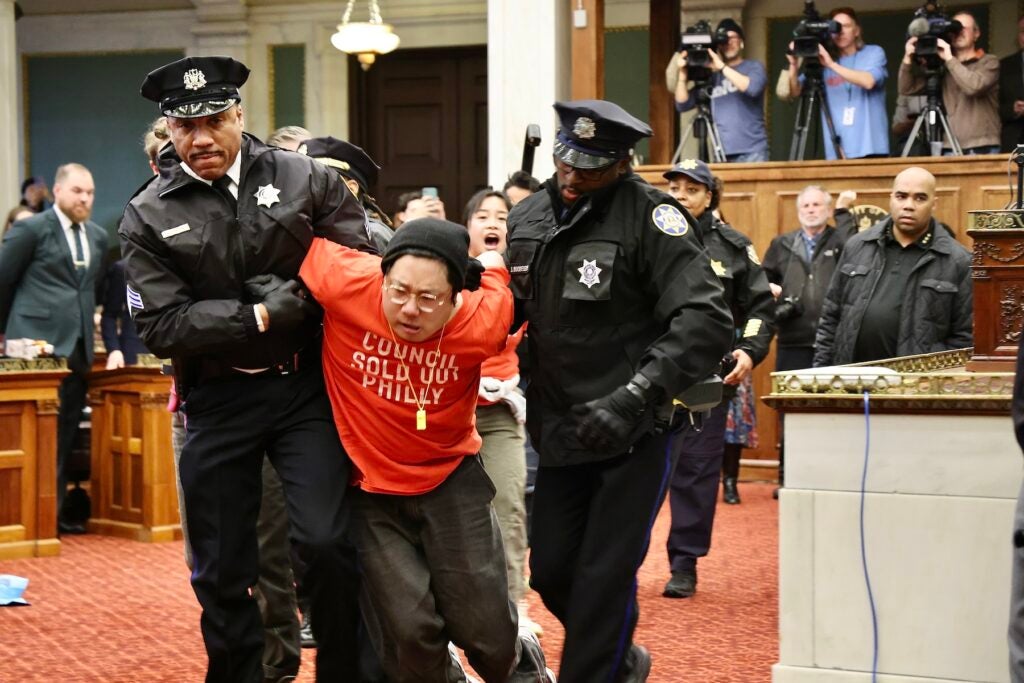
The 18,500-seat arena will sit at 10th and Market streets atop SEPTA’s Jefferson’s Station. It will replace about one-third of the existing Fashion District mall and feature ground floor retail. And a new pedestrian bridge will connect the remaining sections of the mall to the arena.
The team argues the arena will be an economic engine for Market East, a disjointed stretch of retail, government buildings and tourist attractions that has struggled to thrive for decades despite millions in investment. Officials say the investment will encourage other developers to follow suit.
Parker, and the city’s powerful building trades, have echoed those sentiments while touting the thousands of construction jobs the arena will create, and the millions in tax revenue the development is projected to generate.
Demolition is scheduled to start in June 2026, with construction expected to start at the end of August 2028.
“Am I excited that our Sixers are staying home? Yes I’m excited,” said Parker during a news conference on Thursday, calling the final vote “monumental.”
Arena proponents and opponents speak out
Several bills passed Thursday are related to the physical development of the arena. Other measures are aimed at preserving the scale of Chinatown while preventing displacement in the neighborhood, which sits steps from the site.
The package includes a bill that enables the city to lease the arena site back to the Sixers, an arrangement that exempts the team from paying property taxes. The team will instead contribute PILOTS — payments in lieu of taxes — to the city and its school district.
The same ordinance details an economic opportunity plan and a $60 million community benefits agreement. The legally binding document, designed to blunt the impact of the arena on nearby neighborhoods, became a major sticking point during negotiations with the Sixers and council members, with arena opponents decrying the final amount.
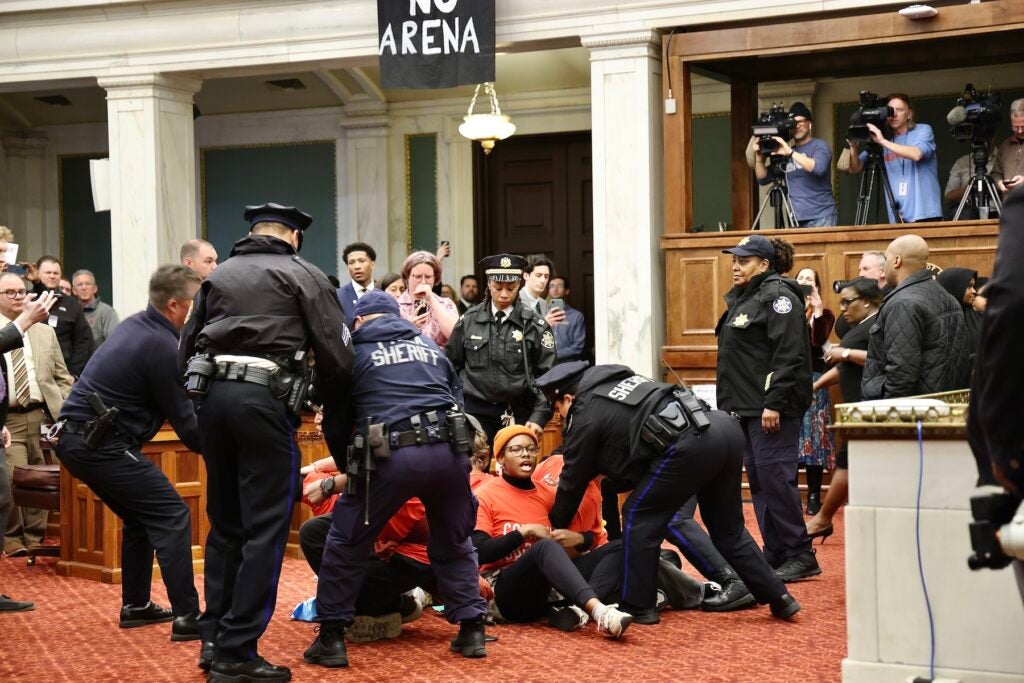
During a series of full-day public hearings devoted to the team’s proposal, lawmakers repeatedly pushed for more money for the CBA, which initially was valued at $50 million. Several council members said the agreement did not include enough funding for initiatives aimed at protecting Chinatown, the closest community to the arena site.
The Sixers initially balked at the idea of going above $50 million. But as the team’s deadline loomed, representatives agreed to increase the CBA. Within about 24 hours, Council’s ask dropped from $100 million to $60 million, an amount Councilmember Mark Squilla had said was the financial floor for the agreement.
Separately, the Parker administration has committed $20 million to affordable housing programs and initiatives in Chinatown.
Before Thursday’s vote, after loudly chanting against the arena, more than two dozen people rushed onto the floor of council chambers. Several of them were handcuffed and led out of the room by law enforcement after they refused to disperse. The incident delayed the start of the meeting by nearly an hour.
“We’re asking for all attendees to please quiet down so we can continue our council session,” said Johnson repeatedly as activists continued chanting against the arena.
“If you do not quiet down…you will be removed,” he added.
Last of protestors removed from council floor #whyynews pic.twitter.com/7KyxQayzY9
— Tom MacDonald--WHYY (@TMacDonaldWHYY) December 19, 2024
Over the next hour, dozens of people took a final opportunity to weigh in on the project during public comment. Many of them told lawmakers the project would be a boon for the city and its residents, while others urged lawmakers to vote against the arena they say presents an existential threat to nearby Chinatown.
“By building an arena in Chinatown, City Hall is saying it’s OK to eradicate communities — all in the name of capitalism,” said activist Caitlin Gee.
Opponents also argued the arena will create the kind of traffic congestion that will dissuade people from coming to Chinatown, hurting hundreds of small businesses as a result.
The Sixers expect that 40% of fans will use public transportation to get to the arena and that 40% of fans will drive. An impact study commissioned by the city found there will be gridlock at major intersections if car traffic goes above that threshold.
The city’s deal with the Sixers does not include any new funding for SEPTA to run additional trains on its Regional Rail lines after games and events. The cash-strapped authority, which is navigating a financial crisis, has said it cannot afford to expand service to accommodate that need.
Members of Philadelphia’s building trades and blue-collar unions also voiced support for the arena, which is expected to create more than 9,000 construction jobs.
The project is also backed by the African-American Chamber of Commerce, the Philadelphia chapter of the NAACP, and the Black Clergy of Philadelphia and Vicinity.
“You cannot grow without investment. We all see how this corridor looks. It is empty, it is blighted and businesses are leaving every day,” said Regina Hairston, the chamber’s president.
“It’s not only opportunity for a construction job, it’s opportunity for a sustainable future. Someone has the opportunity to get on this project and it can be the start of financial freedom, the start of a new life,” said Layla Bibi, council representative for the Eastern Atlantic States Regional Council of Carpenters, which is not a member of the building trades.
In the end, lawmakers voted decisively for the arena.
Councilmembers Johnson, Mark Squilla, Katherine Gilmore Richardson, Cindy Bass, Nina Ahmad, Curtis Jones, Brian O’Neill, Quetcy Lozada, Jim Harrity, Michael Driscoll, Anthony Phillips and Isaiah Thomas voted in favor of the arena legislation.
Councilmembers Nicolas O’Rourke, Jamie Gauthier, Jeffrey Young, Rue Landau and Kendra Brooks voted against the arena, in part because they could not support the final version of the community benefits agreement
After the meeting, Brooks said the arena is “another terrible example of the city’s racing to the bottom to appease billionaires,” saying the vote will galvanize residents to take action for years to come.
“When power and money descend on our communities, we must stand up and fight back — even when the fight is impossible and difficult. The arena vote held today demonstrates how far we have to go to truly listen to and reflect the voices of our community instead of the voices of the wealthy few,” said Brooks
In a statement, Sixers part-owner David Adelman thanked lawmakers and the mayor for supporting the arena, calling Thursday’s vote a “critical milestone.”
“They recognize how important this project is for the revitalization of our city. We would also like to give a heartfelt ‘thank you’ to our many supporters and partners over the past two years for championing this project. Although a lot of work has been done to get here, we know there is much more to do. We look forward to pursuing the remaining approvals to make 76Place a reality,” said Adelman.

Subscribe to PlanPhilly
WHYY is your source for fact-based, in-depth journalism and information. As a nonprofit organization, we rely on financial support from readers like you. Please give today.



